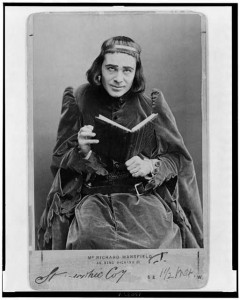The wonders of modern science were used to positively identify a set of human bones found under an asphalt parking lot in England (site of a former church) as those of Richard III – a former king of England and one of Shakespeare’s most memorable villains.
The world was fascinated – it isn’t every day that a set of 500-year-old bones can yield DNA that can be cross-compared with the DNA of two of Richard’s living descendants – and the late monarch even became a trending topic on Twitter.
But one question remains unanswered. Was Richard “rubbished” (the British equivalent of our informal term “trashed”) by political foes rewriting history, and their scribes, including Shakespeare?
Did Shakespeare smear him ? Was the man known for orchestrating the death-by-drowning of one foe (in a barrel of Malmsey, or Madeira wine), and prime suspect in the deaths of two young princes who could block his ascension to the throne unfairly depicted? Was he one of the great “not-nice guys” in all of British history and English lit, or not?
We may never know. But what we do know is that great actors have reveled in playing Richard III for hundreds of years – and the Library of Congress has a wonderful array of photos, illustrations and broadsides in its Prints & Photographs Division showing various actors playing the man in whose mouth Shakespeare put the phrase, “The winter of our discontent.”
Here’s one of them: Richard Mansfield, who acted in England and the United States in the late 1800s and early 1900s. He was lionized for his Shakespeare, and was a early embracer of the works of George Bernard Shaw. Mansfield also acted early in his career in the D’Oyly Carte Opera Company, playing Sir Joseph Porter, K.C.B. in Gilbert & Sullivan’s ”H.M.S. Pinafore,” Major-General Stanley in “The Pirates of Penzance” and title figure John Wellington Wells in “The Sorcerer.”
Paul Wilstach’s book about Mansfield, “Richard Mansfield, The Man and the Actor,” indicates that Mansfield himself felt that Plantagenet Richard was the victim of Tudor spin, as evidenced on page 178 …
What do you think?


February 4, 2013 at 5:58 pm
One of the Ricardian crowd’sr arguments has been that there is no contemporaneous evidence of Richard III’s deformity and since that is the case everything else Shakespeare and others said about him must be motivated by hate. Now we find in fact he probably was somewhat misaligned. So of at least one thing the villainizers said, we now have concrete evidence. Of course the Tudors slung mud, but you can’t really tarnish someone who contemporaries didn’t already have pretty dark suspicions about. And there can be no doubt whatsoever, whether his motivations were good or evil, that he was a usurper.
February 6, 2013 at 5:06 am
There is a saying ” To call good bad and bad good”.
The War of the Roses was a long and very bitter Civil War. The
reprecussions are still being felt today.